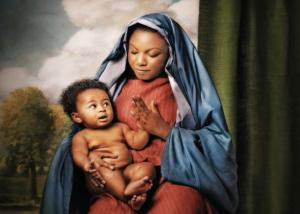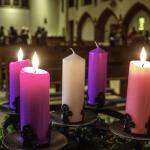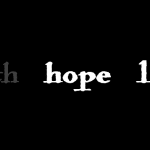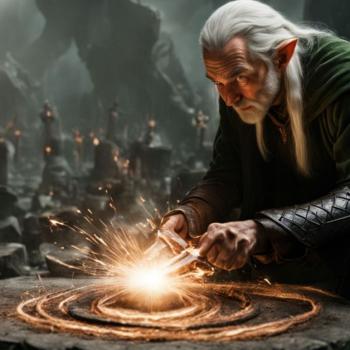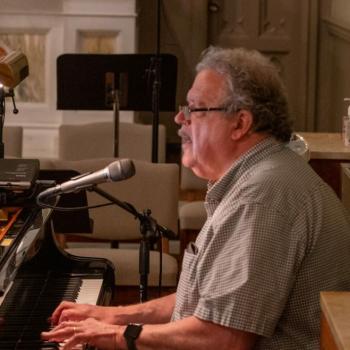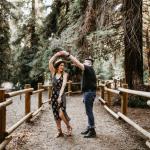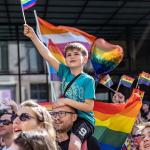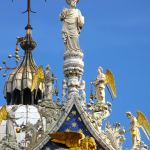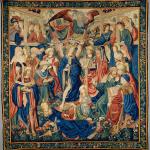Dark Devotional: Mary, Motherhood, and Mixed Feelings
Behold, I am the handmaid of the Lord. May it be done to me according to your word.
The final Sunday of Advent, the Sunday of Mary’s assent, the Sunday of motherhood. It is also the Sunday of Mary, did you know? and Breath of Heaven.
Let’s dispense with Mary, did you know? forthwith – yes, she bloody well did. We’ll come back to Breath of Heaven.
Motherhood. I’ll never forget the moment in the middle of a conversation when my friend turned to me and said, ‘Is your mother dead?’
I looked at her, puzzled, and said, ‘No, why?’
She responded, ‘Because you always talk about your father, never your mother.’ And I realised she was right. You can see evidence of it here. Almost 3,000 words and she barely gets a look in.
That would be because she barely gave us a look in. My mother was – is, even more pronouncedly in her dementia – decidedly absent, despite being physically present. She went through life in a fugue, except for the times that her rage exploded into our world. Broken plates, shouting, hitting – almost the only touches I remember from her were rough or uncomfortable, controlling ones.
My relationship with her is some weird combination of void and spider web sticky. She would be in that fugue state for ages, break plates in rage, then at random points become grasping and needy, claiming to want a mother-daughter relationship, demanding cozy chats at night after she’d settled in bed. I’d pour parts of my heart out, which she would immediately report to my father, which then became fodder for his rage and abuse.
Amidst my hatred and contempt – never more pronounced than when my grandfather died and she became utterly non-functional while the rest of us got on with our lives – there was a need to be seen and loved by her, to be at the centre of her world, alongside my brother.
Needless to say, from the early pictures of me as a newborn, where she couldn’t bring herself to look at me, to teenage/young adult pictures where our fractured relationship was evident, that love was never coming. She was forever indifferent, unless I was an essential object of her rage or desperate need.
So yeah, pass me with your Mother’s Day/Mothering Sunday/saccharine mother-child bullshit. If I see you being touchy-feely with your teenage/adult child, I’ll assume you’re grabby and controlling. If I hear you go on about how your child can do no wrong, I’ll assume you’re raising an entitled monster. If all I ever see is you cooing over your child’s sports/special activity/pageants, I’ll assume you’re a pushy stage mum. Don’t even get me started on how often I suspect Munchausen by proxy.
When I look at mothers, I look for signs of incipient filial cannibalism and never trust evidence of unconditional love.
Though I don’t often voice it, that’s one of the reasons I am so fiercely pro-choice. To my Catholic friends, I talk about rape, incest, and the mother’s life being in danger, because that’s what they can hear, if they’re capable of hearing anything. To my secular friends, I add the part about women not being forced into parenthood, because that’s what they can hear.
But what I never say is that I would rather have been miscarried or aborted than be born to and raised by my mother. It would have been far better to let me go and allow me to ensoul into a babe who was desperately loved and wanted. No child should have to grow up with a mother who doesn’t want them, who resents their very existence. Don’t give me that bullshit about how it made me stronger, how it ‘built resilience,’ how I wouldn’t be who I am without it. Fuck that. People need to be tortured and wounded to build character? Don’t you think unconditional love and community should do that?
Being loved is not a privilege, it is foundational to our existence. If you think strength, growth, and building character only happen through abuse and adversity, your outlook and your society are toxic. The resistance needed for growth is stretching out of one’s comfort zone, not trauma. Not only that, your imagination is profoundly stunted if you can’t see how love and goodness generate more (and sustainable) love and goodness.
Suffice it to say, my view of motherhood leans more toward Snow White’s stepmother than Molly Weasley or Dr. Murry from A Wrinkle in Time.
That’s my limp. The only reason it’s a limp and not an amputation is because of friends’ mums who welcomed me into their homes and hearts (looking at you, Viv Dorwart, Ann Fauconnet, Anne Brumfitt (RIP), and others). Though I could only receive eye-droppers of love from these mother figures at first, those small amounts made their mark, slowly but surely. As that love penetrated, I began to view older women with less suspicion, not viewing their reaching out as grasping claws, but as gestures of affection and support. I may still flinch initially, but only with those I don’t know well.
The real breakthrough came when my friends – these amazing women I have laughed, cried, gone ‘WTAF?’ with, and trusted with my life – became mums. While I may have initially struggled with how they could be so close to their mums, I immediately understood how their little ones could be close to them, and I saw how deep love could thrive alongside human imperfection. My friends love being with their kids: they’re not a burden, a duty, or an accessory. They are deeply loved and cherished human beings. Not only that, the fierce love and protectiveness I feel for these children have given me an inkling of what motherhood can be.
I’ve come a long way, but there’s still a long way to go. Healing never ends, it just keeps unfolding.
Did I ever want to be a mother? Believe it or not, fiercely and desperately, but I was also terrified of becoming my mother. And I only wanted to do it in a stable relationship, trusting in my husband to balance, challenge, and help me become the mother every child deserves: unconditionally loving, messy, imperfect, one who allows them to unfold into what G-d dreamt they would be when (S)He created them.
Neither the husband nor the children arrived, by the way, and my feelings were more complicated than I realised. When horrors like Sandy Hook happened, the first prayer to my lips was for the children and their families, the second was ‘Thank you, G-d, that I am not a mother. I could not have borne that.’ Clearly, I wasn’t ready to let a sword pierce my own soul.
Despite those prayers, there was grief at what was never to be, as peri-menopause and then menopause arrived. As I worked through that, I began to realise that perhaps motherhood was much broader than I had believed it to be. Perhaps I had been a mother when I had students I loved dearly, even as they made me angry and drove me up the wall. Perhaps I was a mother when Marie sat in my classroom and needed to talk. Perhaps I was a mother when friends’ kids laid their heads on my shoulder, telling me something they couldn’t yet tell their parents. Perhaps I was a mother whenever I held the space for something to be born: healing, a revelation, a project, a new way of being.
In some way, I realised that because I had no child of my own, every child was my child. That’s where Mary came in.
Oddly, I’d always been drawn to her, perhaps initially as a ‘safe’ mother, one who would never actually be there. Long before I became Catholic, I would recite the Hail Mary in times of danger, such as driving through a snowstorm. I had an inexplicable sense of being her child…and loved.
I sat in wonder at her fiat, knowing what it might cost her, particularly as her pregnancy became visible. I marveled at her love for this newborn babe and how that manifested in her worry and anger when she and Joseph found him at the temple. I wondered what she pondered in her heart when Simeon spoke. I cackled at her words to Jesus at Cana and the affection evident in His response. I loved images of her tickling Jesus’ feet and my heart shattered in the image of her at the foot of the cross – the inevitable end to her allowing Him to unfold into the man He was meant to become.
Breath of Heaven, written by English songwriter Chris Eaton, was the first song about her that I remember hearing, and it shook me to the core. She was no longer only a mum, but a fellow woman on the road: uncertain, afraid, and praying the only possible prayer:
Breath of heaven
Hold me together
Be forever near me
Breath of heaven.
Breath of heaven
Lighten my darkness
Pour over me your holiness
For you are holy
Breath of heaven.
People may say, ‘Blessed are you who believed that what was spoken to you by the Lord
would be fulfilled,’ but that doesn’t make the road any less difficult, lonely, and frightening.
And in the end, isn’t her song about all of us and the roads we take? For if motherhood is conceiving, carrying, and birthing things into the world, then aren’t we all mothers? Whether it is a babe, a therapy session, being with someone in their grief, building a homeless shelter or a woman’s refuge, infrastructure and a social safety net, building peace, ending poverty – don’t all of these things have mothers, whatever their gender? And isn’t that loneliness, fear, and doubt all part of conceiving, carrying, and birthing all these children into the world, whatever form they take?
No matter how painful and complicated my feelings about motherhood may be, I cannot turn away from it. I must lift the mantle and don it, for, as Meister Eckhart said,
We are all meant to be mothers of God, for God is always needing to be born.
And that is not a vocation I can turn away from. All I can do is step forward, in all my messy love, woundedness, terror, and doubt, echoing what the songwriter of Breath of Heaven and I imagine Mary must have said to the Father one lonely night:
Do you wonder as you watch my face
If a wiser one should have had my place?
But I offer all I am –
For the mercy of your plan.
Help me be strong.
Help me be.
Help me.
Irim Sarwar is an American of IndoPak ancestry now living in the UK who was born Muslim and became Catholic via teaching at a Modern Orthodox Jewish school. She has also catalogued books in a Dominican priory, worked in quality assurance, and is currently a churchwarden and freelance copyeditor/proofreader. Spiritual mongrel. Believes in hybrid vigour in all things, especially journeys of faith.

